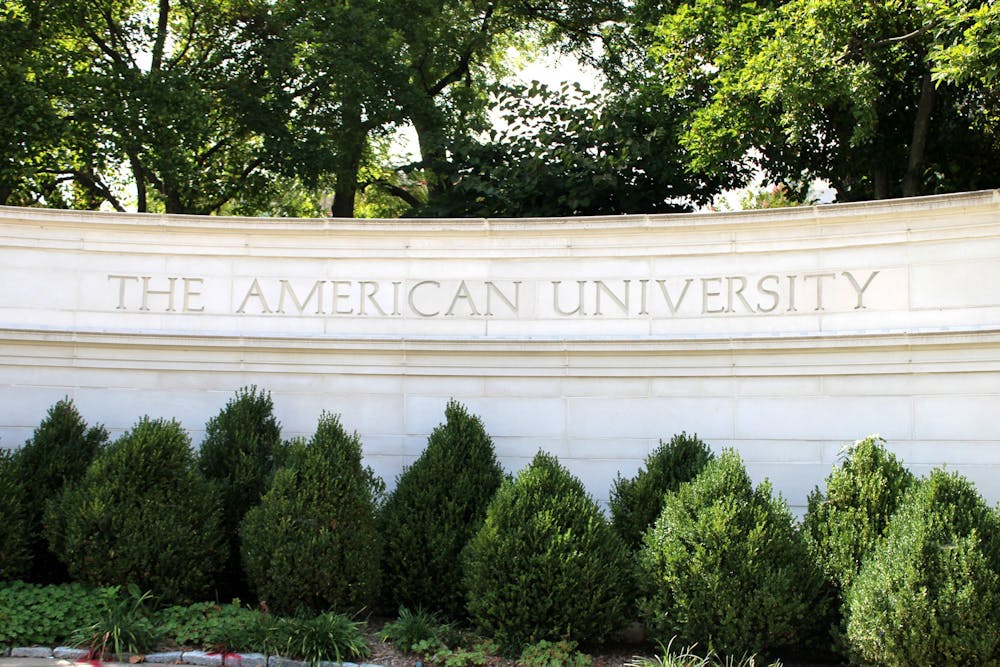American University’s Board of Trustees met May 16 and 17 to discuss new policies surrounding campus climate, address a decline in undergraduate enrollment and recap progress on the Change Can’t Wait campaign during President Sylvia Burwell’s last semester as president.
The Board’s focus on these areas will “help shape both our next academic year and connect to our long-term direction as a community,” Gina Adams, chair of the Board, wrote in a May 29 email.
The University’s administration crafts University policy, which may be brought to the Board for discussion. The Board itself will vote to approve certain changes like tuition increases and new degree programs, but the Board does not make policy.
Board and Admin Discuss Speech Policies
Vice President Traevena Byrd and Vice President Raymond Ou discussed with the Board “ongoing efforts to update key university policies” related to campus climate and speech policies implemented in January.
Policy areas under development by the administration include students' abilities to chalk, post and table. Administration is also reviewing the student conduct code, facilities use and the manual for recognized student organizations.
Assistant Vice President for Community and Internal Communications Elizabeth Deal told The Eagle that,“the intent is for these updated policies to succeed the interim actions taken during the Spring semester.”
The policy review follows the Spring 2024 semester when indoor protests were banned and the University chapter of Students for Justice in Palestine was put on disciplinary probation by the administration after a silent walk through University buildings.
“The policy review included understanding best practices across higher education, engaging campus stakeholders for input, identifying areas in current policies for modernization and clarification, and ensuring consistency with the free expression policy and other relevant university policies,” said Deal.
AU Addresses Dwindling Enrollment
The Board also discussed the University’s decline in enrollment for the 2024-2025 academic year, with deposits down 11 percent from last year. Adams said that 2024 “is one of the most challenging undergraduate enrollment years in history.” However, AU is faring better than many of its peer institutions that are facing a near-20 percent decline in admissions, Adams added.
The University saw graduate deposits “tracking 15 percent above last year’s numbers.” AU previously attributed some of its $33 million budgetary shortfall to lower-than-expected Spring 2024 graduate enrollment.
AU attributed lower deposits to the “demographic cliff,” a decline in the typical 18-25 year old college-age population. To meet their enrollment targets and address undergraduate lower enrollment, AU will increase admittances from this application cycle's waiting list and provide deposit extensions.
“We must maintain high levels of engagement with our currently deposited students to minimize summer melt and look at how all our work intersects with the student experience,” said Adams in the Board’s email. “Summer melt,” as Adams refers to it, is the loss of a small number of students between the months of May and August as formerly committed first years decide to ultimately unenroll.
The Board also announced in the email it approved bachelor of arts degrees in computer science, computation sciences and early childhood education, but also approved cutting the master of sciences degrees in mathematics of information security and organization development.
Change Can’t Wait Campaign Meets Goal
Vice President Courtney Surls reported that the University was less than $9 million away from completing the campaign's $500 million goal, which Burwell announced was met in a June 18 email.
The Board also recognized Burwell’s seven year tenure at AU and her administration's accomplishments. The Board praised the University’s achievement as America’s first carbon neutral campus, a 60 percent increase in the University’s endowment and the $109 million launch of the new Student Thriving Complex during Burwell’s tenure.
The Board is on recess during the summer and will meet on September 4 and 5 for its annual retreat, the first meeting under incoming President Alger’s administration.
This article was edited by Olivia Wood, Tyler Davis and Abigail Turner. Copy editing done by Luna Jinks and Ella Rousseau.





